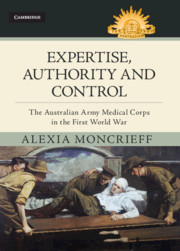Book contents
- Expertise, Authority and Control
- Other titles in the Australian Army History Series
- Expertise, Authority and Control
- Copyright page
- Contents
- Figures, maps and tables
- Preface
- Acknowledgements
- Note on style
- Abbreviations
- Introduction
- Chapter 1 Gallipoli
- Chapter 2 Medicine in the lines
- Chapter 3 The Western Front in 1918
- Chapter 4 A pleasant dose of medicine?
- Chapter 5 The most difficult problem
- Conclusion
- Notes
- Bibliography
- Index
Chapter 1 - Gallipoli
A case of criminal negligence?
Published online by Cambridge University Press: 10 February 2020
- Expertise, Authority and Control
- Other titles in the Australian Army History Series
- Expertise, Authority and Control
- Copyright page
- Contents
- Figures, maps and tables
- Preface
- Acknowledgements
- Note on style
- Abbreviations
- Introduction
- Chapter 1 Gallipoli
- Chapter 2 Medicine in the lines
- Chapter 3 The Western Front in 1918
- Chapter 4 A pleasant dose of medicine?
- Chapter 5 The most difficult problem
- Conclusion
- Notes
- Bibliography
- Index
Summary
Under oath at the Dardanelles Commission, convened in 1917 to investigate the Gallipoli campaign, Surgeon General Sir Neville Howse, Director of Medical Services (DMS) for the Australian Imperial Force (AIF), stated that ‘as far as the Australian troops were concerned’ medical arrangements for the Gallipoli campaign ‘were so inadequate that they amounted to criminal negligence’.1 He squarely laid the blame for this ‘negligence’ on the shoulders of the British General Staff and informed the commissioners that he intended to share his concerns with Australia’s leaders. A palpably frustrated Howse stated: ‘I personally will recommend my Government when this war is over, that under no conceivable conditions ought they ever to trust to the medical arrangements that may be made by Imperial authorities for the care of their sick and wounded.’2 His scathing critique not only called into question the British General Staff’s ability to plan and execute a comprehensive strategy but also revealed his doubt regarding the benefits of Australian deference to Britain in medical–military matters.
Keywords
- Type
- Chapter
- Information
- Expertise, Authority and ControlThe Australian Army Medical Corps in the First World War, pp. 19 - 48Publisher: Cambridge University PressPrint publication year: 2020

